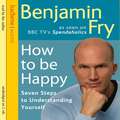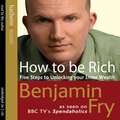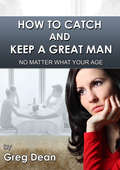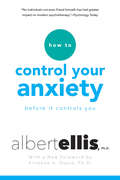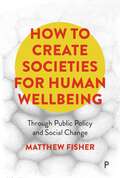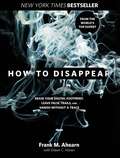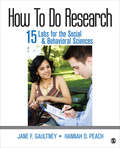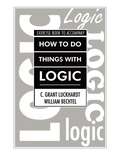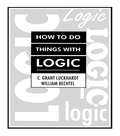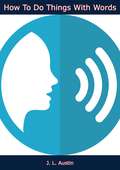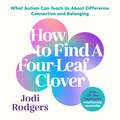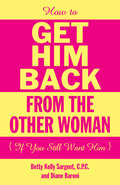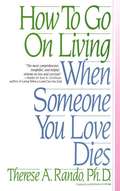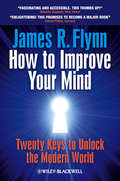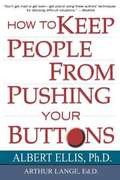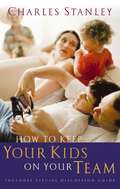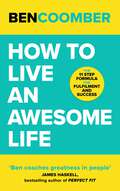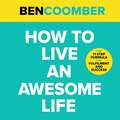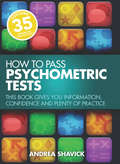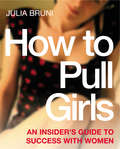- Table View
- List View
How To Be Happy: Seven Steps to Understanding Yourself
by Benjamin FryDoes your life seem to have all the right ingredients yet you find your goals are still out of reach?Do you find yourself involved in the same emotional situations again and again?In How to be Happy, Benjamin Fry guides you through his seven-step programme which will help you to improve your life: by learning to understand yourself, you can achieve the happiness you deserve.Based on an exclusive live seminar presented here for the first time as an audiobook, Benjamin interlaces his techniques with his own stories and experiences that show how he has developed his methods. Demonstrating how his theories work in practice, Benjamin introduces you to the simple ideas that you too can use to achieve the happiness you have always hoped for.
How To Be Rich: Five Steps to Unlocking Your Inner Wealth
by Benjamin FryDo you long for the freedom and emotional wellbeing that money can bring? Are you fed up with money being a source of worry rather than pleasure? The feeling of not having enough money is one of today's main causes of stress, but now you can equip yourself to change this. With Benjamin Fry's guidance you can achieve a positive attitude to money, end the worry and leave yourself free to increase your wealth: change how you think about your money and you will change how much money you have.How To Be Rich breaks down the negative attitudes to money that have become so ingrained in our lives that we don't even realise they're there. Revealing the five common problems, and the straightforward methods to recognise them, Benjamin's programme will empower you to stop worrying about debt and start to enjoy your new abundant life.
How To Catch and Keep a Great Man No Matter What Your Age
by Greg DeanHow to find, catch and keep an amazing, strong man for and live in a passionate long term love affair.Imagine a life where, no matter what your age, younger or older, you knew the steps to take to not only catch an amazing, gorgeous, strong, secure man, but you had the power to actually keep him solely focused and genuinely, passionately in love with you.Imagine if you could awaken that lost little girl inside to make her come out and play again and have the very best men you meet, turn their heads in awe of your beautiful energy .Forget the advice of other women. Here is the step by step guide by a world renowned, crazy fun, MALE date coach who can tell you exactly what great men want in a woman with absolutely no confusion and zero games.Ordinary men are easy to catch for the sassy girl. But to catch and keep a GREAT man, your perfect man, that requires true mastery in social dynamics for women and you will learn it here.A perfect dating advice book for women.This book will give you step by step instructions from a solid, firm male perspective on how to steal the heart of a great man and live in a passionate relationship the way you did so long ago, making him dote on you, care for you and be your prince.Never satisfied, feeling you cannot meet any great men at your age, whatever that age is? This book will help you end the great drought.Where did all the great men go? They are hiding from YOU. Let's begin this new journey where great men reveal themselves to you once again, giving you the best options in the men you meet, no matter what your age.
How To Control Your Anxiety Before It Controls You: Before It Controls You
by Albert EllisLearn to manage your anxiety with this classic self-help book from a respected pioneer of psychotherapy. From social anxiety to phobias to post-traumatic stress disorder, sources of anxiety in daily life are numerous, and can have a powerful impact on your future. By following the rules of Rational Emotive Behavior Therapy (REBT), created by world renowned therapist Dr. Albert Ellis, you can stop anxiety in its tracks if you will admit this important fact: Things and people do not make you anxious. You do. Your unrealistic expectations produce your needless anxiety. Yet not all anxiety is needless . . .Healthy anxiety can ward off dangers and make you aware of negative things that you can change. Unhealthy anxiety inhibits you from enjoying everyday activities and relationships, causes you to perform poorly, and blocks your creativity. Using the easy-to-master, proven precepts of REBT, this classic book not only helps you distinguish between healthy and unhealthy anxiety, but teaches you how to:• Understand and dispute the irrational beliefs that make you anxious• Use a variety of exercises, including rational coping self-statements, reframing, problem-solving methods, and Unconditional Self-Acceptance (USA), to control your anxiety• Apply over two hundred maxims to control your anxious thinking as well as your bodily reactions to anxiety . . . and much more, including examples from dozens of cases Dr. Ellis treated successfully. Now you can overcome the crippling effects of anxiety—and increase your prospects for success, pleasure, and happiness at home and in the workplace.&“No individual—not even Freud himself—has had a greater impact on modern psychotherapy.&” —Psychology Today
How To Create Societies for Human Wellbeing: Through Public Policy and Social Change
by Matthew FisherWellbeing is a hot topic: governments, psychologists and a thousand self-appointed ‘experts’ all claim to promote it and yet our societies are experiencing record levels of mental distress and ill-health. Why? Matthew Fisher presents a compelling new perspective on psychological wellbeing informed by evidence on human stress responses. He shows how our mental health is shaped by the social and cultural conditions in which we all live. Developing arguments and strategies for a society truly committed to wellbeing, this book offers new ways to understand the problems facing modern societies and ways to respond through political and social change.
How To Disappear: Erase Your Digital Footprint, Leave False Trails, And Vanish Without A Trace (Globe Pequot Ser.)
by Eileen Horan Frank AhearnHow to Disappear is the authoritative and comprehensive guide for people who seek to protect their privacy as well as for anyone who’s ever entertained the fantasy of disappearing—whether actually dropping out of sight or by eliminating the traceable evidence of their existence. <p><p> Written by the world’s leading experts on finding people and helping people avoid being found, How to Disappear covers everything from tools for disappearing to discovering and eliminating the nearly invisible tracks and clues we tend to leave wherever we go. Learn the three keys to disappearing, all about your electronic footprints, the dangers and opportunities of social networking sites, and how to disappear from a stalker. <p> Frank Ahearn and Eileen Horan provide field-tested methods for maintaining privacy, as well as tactics and strategies for protecting personal information and preventing identity theft. They explain and illustrate key tactics such as misinformation (destroying all the data known about you); disinformation (creating fake trails); and, finally, reformation—the act of getting you from point A to point B without leaving clues. <p> Ahearn illustrates every step with real-life stories of his fascinating career, from undercover work to nab thieving department store employees to a stint as a private investigator; and, later, as a career “skip tracer” who finds people who don’t want to be found. In 1997, when news broke of President Bill Clinton’s dalliance with a White House intern, Ahearn was hired to find her. When Oscar statuettes were stolen in Beverly Hills, Ahearn pinpointed a principal in the caper to help solve the case. When Russell Crowe threw a telephone at a hotel clerk in 2005, Ahearn located the victim and hid him from the media. <p> An indispensable resource not just for those determined to become utterly anonymous, but also for just about anyone in the brave new world of on-line information, How to Disappear sums up Ahearn’s dual philosophy: Don’t break the law, but know how to protect yourself.
How To Do Research: 15 Labs for the Social & Behavioral Sciences
by Jane F. Gaultney Hannah D. PeachDesigned to help students make the leap from learning about research to doing research, this manual provides an easy-to-understand walkthrough of the entire research process, from selecting a topic and conducting a literature review through presenting an APA-style paper or presentation. All of the 15 cross-disciplinary labs included are appropriate for use in the social, behavioral, and health sciences, and follow a consistent format: objective, description of a journal article, canned data, examples of what output should look like, pointers on interpreting the output, and a suggested activity for those who wish to collect their own data.
How To Do Research: 15 Labs for the Social & Behavioral Sciences
by Jane F. Gaultney Hannah D. PeachDesigned to help students make the leap from learning about research to doing research, this manual provides an easy-to-understand walkthrough of the entire research process, from selecting a topic and conducting a literature review through presenting an APA-style paper or presentation. All of the 15 cross-disciplinary labs included are appropriate for use in the social, behavioral, and health sciences, and follow a consistent format: objective, description of a journal article, canned data, examples of what output should look like, pointers on interpreting the output, and a suggested activity for those who wish to collect their own data.
How To Do Things With Logic Workbook: Workbook with Exercises
by C. Grant Luckhardt William Bechtel Grant LuckhardtIn the past 15 years a host of critical thinking books have appeared that teach students to find flaws in the arguments of others by learning to detect a number of informal fallacies. This book is not in that tradition. The authors of this book believe that while students learn to become vicious critics, they still continue to make the very mistakes they criticize in others. Thus, this book has adopted the approach of teaching the construction of good arguments first and then introducing criticism as a secondary skill. Moreover, the emphasis of the book is not on learning to name fallacies, but on being able to identify weaknesses in an argument so as to be able to construct an effective critique of that argument. The book is accompanied by a workbook featuring a wealth of examples to help students acquire the material.
How To Do Things With Logic: Workbook With Exercises
by C. Grant Luckhardt William Bechtel Grant LuckhardtIn the past 15 years a host of critical thinking books have appeared that teach students to find flaws in the arguments of others by learning to detect a number of informal fallacies. This book is not in that tradition. The authors of this book believe that while students learn to become vicious critics, they still continue to make the very mistakes they criticize in others. Thus, this book has adopted the approach of teaching the construction of good arguments first and then introducing criticism as a secondary skill. Moreover, the emphasis of the book is not on learning to name fallacies, but on being able to identify weaknesses in an argument so as to be able to construct an effective critique of that argument. The book is accompanied by a workbook featuring a wealth of examples to help students acquire the material.
How To Do Things With Words: The William James Lectures Delivered In Harvard University In 1955 (Oxford Paperbacks Ser. #1)
by J. L. AustinJohn L. Austin was one of the leading philosophers of the twentieth century. The William James Lectures presented Austin's conclusions in the field to which he directed his main efforts on a wide variety of philosophical problems. These talks became the classic How to Do Things with Words. For this second edition, the editors have returned to Austin's original lecture notes, amending the printed text where it seemed necessary. Students will find the new text clearer, and, at the same time, more faithful to the actual lectures. An appendix contains literal transcriptions of a number of marginal notes made by Austin but not included in the text. Comparison of the text with these annotations provides new dimensions to the study of Austin's work.—Print ed.
How To Find A Four-Leaf Clover: What Autism Can Teach Us About Difference, Connection and Belonging
by Jodi Rodgers'We could all use a Jodi in our lives' The New York TimesJodi Rodgers, on-screen autism specialist from Netflix's Love On the Spectrum, draws on three decades of experience as a teacher and counsellor to help neurodivergent and neurotypical people find ways to communicate, connect, and thrive.Blending the latest research on the neurology of the autistic brain with intimate, heartwarming stories about the incredible humans Jodi has worked with during her career, How to Find A Four-Leaf Clover helps us use this knowledge to better understand not only the behaviour of autistic people, but our own. Highlighting how we are more similar than we are different, and that everyone is deserving of love and connection, this inspiring book will help us become more empathetic and curious about all the relationships in our lives.
How To Get Along With Almost Anyone
by H. Norman WrightThe book is packed with inspiration and practical ideas to dramatically improve the quality of your relationships with your friends, co-workers, your spouse, and even your mother-in-law. Mr. Wright draws on a wealth of Scripture to show us how to heal broken hearts and shattered relationships.
How To Get Him Back From The Other Woman (If You Still Want Him)
by Diane Baroni Betty Kelly Sargent, C.P.C.Statistics show most unfaithful men do come back. Two former Cosmopolitan editors show you just what to do to make that happen. You'll learn how to: *Keep yourself together after you find out *Understand why he did it - the top ten reasons *Acknowledge the four things you should never, ever do - no matter how tempting they seem *Recognize The Six Stages of Healing *Take Action - your ten top To-Do's *And much more A book every woman should read. - Carolyn Bushong, author of Loving Him Without Losing You
How To Go On Living When Someone You Love Dies
by Therese A. RandoMourning the death of a loved one is a process all of us will go through at one time or another. But whether the death is sudden or anticipated, few of us are prepared for it or for the grief it brings. There is no right or wrong way to grieve; each person's response to loss will be different. Now, in this compassionate, comprehensive guide, Therese A. Rando, Ph. D., bereavement specialist and author of Loss And Anticipatory Grief, leads you gently through the painful but necessary process of grieving and helps you find the best way for yourself. Whether the death was sudden of expected, from accident, illness, suicide, homicide, or natural causes, Dr Rando will help you learn to: Understand and resolve your grief. Talk to children about death. Resolve unfinished business. Take care of yourself. Accept the help and support of others. Get through holidays and other difficult times of the year. Plan funerals and personal bereavement rituals. How To Go On Living With Someone You Love Dies also includes a comprehensive resource listing and a chapter on finding professional help and support groups. There is no way around the pain of loss, but there is a way through it. Dr Rando offers the solace, comfort, and guidance to help you accept your loss and move into your new life without forgetting your treasured past.
How To Improve Your Mind
by James R. FlynnBecome the master of your world Presents 20 key concepts, or keys, to aid critical thinking Authored by one of the world's most eminent psychologists - and founder of the Flynn Effect Looks at topics such as Race and IQ, "good" science and the current world economic crisis Written in a clear and lucid style, illustrated with many examples
How To Keep People From Pushing Your Buttons
by Albert Ellis Arthur LangePresents proven strategies for not reacting to antagonists, revealing a third path between getting mad and getting even, and offers advice on how to stop worrying about what people think, avoiding difficult situations and responsibilities, trying to please everyone, and more.
How To Keep Your Kids On The Team
by Charles F. StanleyIt's not what you think that will impact your child; it's what you communicate. Charles Stanley focuses on the parental role as one of stewardship rather than ownership. As a parent, you have a stewardship entrusted to you, and are responsible to God for your actions toward your children. To keep your children on your team, you must assure them from the beginning that you are on theirs.
How To Live An Awesome Life: The 11 Step Formula for Fulfilment and Success
by Ben CoomberTake a moment to consider what you want for your future. What do you want your body to look and feel like? What career do you want? What experiences do you dream of conquering?Living a life of passion, purpose and fulfilment, on your own terms, in your own way, is the key to happiness - so why are you waiting around and not taking bold action? Why hide behind upbeat selfies, making excuses instead of following your dreams? If your life isn't inspiring you, it's time to change.In 11 inspiring, actionable steps, this book will help you set BIG achievable goals that shape the life you want to live. You'll discover how to be fitter, happier and more successful, to live with vitality and zest for all that's in your life, and to ultimately live a life of fulfilment, accomplishing all your dream of, with zero regrets. Life success isn't a secret. It's a blueprint. And it's in this book. Your AWESOME future is waiting.
How To Live An Awesome Life: The 11 Step Formula for Fulfilment and Success
by Ben CoomberTake a moment to consider what you want for your future. What do you want your body to look and feel like? What career do you want? What experiences do you dream of conquering?Living a life of passion, purpose and fulfilment, on your own terms, in your own way, is the key to happiness - so why are you waiting around and not taking bold action? Why hide behind upbeat selfies, making excuses instead of following your dreams? If your life isn't inspiring you, it's time to change.In 11 inspiring, actionable steps, this book will help you set BIG achievable goals that shape the life you want to live. You'll discover how to be fitter, happier and more successful, to live with vitality and zest for all that's in your life, and to ultimately live a life of fulfilment, accomplishing all your dream of, with zero regrets. Life success isn't a secret. It's a blueprint. And it's in this book. Your AWESOME future is waiting.
How To Live An Awesome Life: The 11 Step Formula for Fulfilment and Success
by Ben CoomberIt's time to go big - this audiobook will help you visualise your life at its most awesome and show you exactly how to get there. BIG change is possible!Take a moment to consider what you want for your future. What do you want your body to look and feel like? What career do you want? What experiences do you dream of conquering?Living a life of passion, purpose and fulfilment, on your own terms, in your own way, is the key to happiness - so why are you waiting around and not taking bold action? Why hide behind upbeat selfies, making excuses instead of following your dreams? If your life isn't inspiring you, it's time to change.In 11 inspiring, actionable steps, this audiobook will help you set BIG achievable goals that shape the life you want to live. You'll discover how to be fitter, happier and more successful, to live with vitality and zest for all that's in your life, and to ultimately live a life of fulfilment, accomplishing all your dream of, with zero regrets. Life success isn't a secret. It's a blueprint. And it's in this audiobook. Your AWESOME future is waiting.(P) 2023 Hodder & Stoughton Limited
How To Love A Difficult Man
by Nancy GoodThis book talks about common relationship problems that women experience in a warm, engaging style. This isn't a book about bashing men or demanding your rights. Rather, it's a book about asking for what women want and need in a clear, positive way. It advises women to know their own value as a person and to handle these issues with respect and dignity.
How To Pass Psychometric Tests: This Book Gives You Information, Confidence And Plenty Of Practice
by Andrea ShavickIn this book, author Andrea Shavick explains all there is to know about psychometric tests: what they are, what they measure, who uses them, why they're used, how they're changing, how to survive them, and even how to avoid them altogether! It includes 35 different, genuine, practice test from SHL Group pls, the world's biggest test publisher. It has 265 questions covering verbal, numerical, abstract and spatial reasoning; mechanical comprehension; fault diagnosis; acutness and personlaity. This book gives you the information, confidence and practice to pass psychometric tests.
How To Pass Psychometric Tests: This book gives you information, confidence and plenty of practice
by Andrea ShavickIn this book, author Andrea Shavick explains all there is to know about psychometric tests: what they are, what they measure, who uses them, why they're used, how they're changing, how to survive them, and even how to avoid them altogether! It includes 35 different, genuine, practice test from SHL Group pls, the world's biggest test publisher. It has 265 questions covering verbal, numerical, abstract and spatial reasoning; mechanical comprehension; fault diagnosis; acutness and personlaity. This book gives you the information, confidence and practice to pass psychometric tests.
How To Pull Girls: An Insider Guide To Success With Women
by Julia BruniFor many men, changes in society have made it harder to get to know women and pulling has become more difficult than it's ever been. The result is that many capable and otherwise successful young men feel frustrated by not having a girlfriend - or even a lay. How to Pull Girls gives the lowdown on how to meet and charm girls. Whether you need to relax and set women at ease, or to understand how girls think and what motivates them, Julia Bruni has all the insider information, analysing the pulling game from every angle. How to Pull Girls is packed full with useful strategies and techniques for every stage of the women-charming mission and will transform you from a Mr Normal to a James Bond in a matter of minutes. This is the essential pulling tool kit 'Women, be warned. Julia's on their side and she is telling them our secrets!'' Kathy Lette
